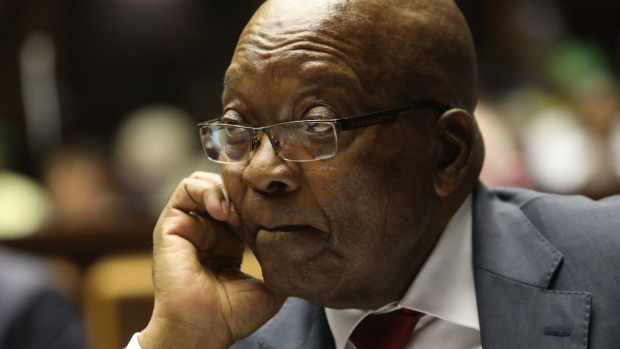Jul 11, 2019
South Africa’s Must-Watch TV: Zuma at Bribery Inquiry Monday
, Bloomberg News

(Bloomberg) -- Former South African President Jacob Zuma will face a judicial panel for the first time next week to answer accusations that he consented to and benefited from widespread looting during his nine-year rule.
Lawyers for the commission of inquiry will question Zuma, 77, about claims by previous witnesses that he allowed members of the Gupta family, who were his friends, to influence his administration’s appointments and to flout government rules to further their business interests. He will also have to respond to testimony that he took bribes from services company Bosasa in exchange for political backing.
Zuma is scheduled to testify from Monday to Friday at the public hearings led by Deputy Chief Justice Raymond Zondo. He’s described the inquiry as a political witch hunt and insists there’s no evidence he’s done anything wrong. While Zuma’s lawyer confirmed he will attend the hearing, the former leader has declined to give substantive answers to the claims in the past, and it’s unclear if he will this time.
The Guptas, who’ve left the country, have also denied wrongdoing.
Zuma was forced to step down by the ruling party in February last year and was replaced by Cyril Ramaphosa.
These are some of the key allegations made at the hearings that are likely to be put to Zuma:
- Former Deputy Finance Minister Mcebisi Jonas said Zuma effectively ceded presidential authority to the Guptas, who offered him the top ministry post and a 600 million-rand ($43 million) bribe if he agreed to fire top Treasury officials blocking their business interests. He declined the offer.
- Themba Maseko, former head of the government communications service, testified that Zuma asked him to help the Guptas, who told him to direct the government’s 600 million-rand advertising budget to the family’s newspaper and television channel. Maseko said he was fired on Zuma’s orders after he refused to comply.
- Former lawmaker Vytjie Mentor said one of the Gupta brothers suggested she could become public enterprises minister on condition she agree to scrap South African Airways flights to India. That would have let the family decide on an airline to run the route. She said Zuma was at the Guptas’ home when the offer -- which she refused -- was made, although he wasn’t at the meeting itself.
- Nhlanhla Nene said he was fired as finance minister in 2015 for resisting Zuma’s attempts to force through a deal to buy nuclear power plants from Russia.
- Fikile Mbalula said he first heard about his appointment as sports minister from one of the Gupta brothers a few days before Zuma officially named him to the post in 2010. Mbalula is now the Minister of Transport.
- Ex-Mineral Resources Minister Ngoako Ramatlhodi said the Guptas exerted an inexplicable influence over Zuma and had the power to summon him to their home. Zuma ignored pleas from his fellow ruling party leaders to break ties with the family, saying they had helped his children when he was in need, according to Ramatlhodi.
- Angelo Agrizzi, Bosasa’s chief operating officer from 1999 to 2016, testified that the company agreed to pay 300,000 rand a month to Zuma’s charitable foundation in return for protection from prosecution. Bosasa Chief Executive Officer Gavin Watson gave the money to the foundation’s chairwoman, according to Agrizzi, who said he counted the cash and was present when several payments were made.
--With assistance from Amogelang Mbatha.
To contact the reporters on this story: Mike Cohen in Cape Town at mcohen21@bloomberg.net;Nkululeko Ncana in Johannesburg at nncana@bloomberg.net
To contact the editors responsible for this story: Paul Richardson at pmrichardson@bloomberg.net, Karl Maier, Gordon Bell
©2019 Bloomberg L.P.





